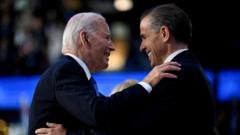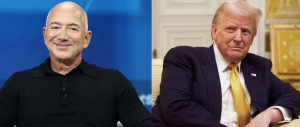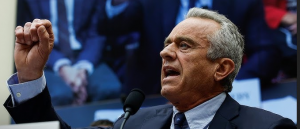In a remarkable turn of events, President Biden has issued a pardon for Hunter Biden, his son, who was embroiled in significant legal troubles resulting from convictions on tax charges and possession of a firearm as an illegal drug user. This pardon follows the president's previous statements asserting that he would not intervene in his son's legal matters, raising questions about the nature of justice and parental duty.
Biden’s Unconditional Pardon for Hunter: A Controversial Decision

Biden’s Unconditional Pardon for Hunter: A Controversial Decision
US President Joe Biden has granted a full pardon to his son Hunter, who faced sentencing on criminal charges, sparking a heated debate on justice and privilege.
Hunter Biden, who has been sober for over five years, pleaded guilty to federal tax fraud and was convicted on gun-related charges, positioning him as the first child of a sitting president to face conviction. The decision to pardon Hunter has sparked criticism from multiple quarters, including direct backlash from Republican figures like Donald Trump, who questioned whether the pardon was a selective exercise of justice amidst ongoing discussions about accountability for Capitol insurrectionists.
In his announcement, President Biden described Hunter's prosecution as a "miscarriage of justice," suggesting political motivations behind the charges. He further expressed a struggle between his personal obligations as a father and his terms as a president, emphasizing the importance of tackling perceived inequalities within the justice system. While many Republicans have condemned the pardon, dissenting voices are also emerging within the Democratic Party, indicating a rift that potentially complicates the current political landscape.
Hunter Biden, acknowledging the gravity of his past missteps, articulated a commitment to dedicating his life to those still grappling with addiction. This case spotlights complex issues of familial loyalty, privilege, and the consequences of addiction in the backdrop of political power.
As this situation continues to unfold, it represents a paradigm shift in the intersection of family and political responsibility, echoing historical instances of presidential pardons for family members while posing critical questions on justice and ethics in governance. The relevance of this incident may evolve as it shapes public perceptions and future discourses on the interplay between criminal justice and political affiliations.
President Biden's pardon of his son serves as both a personal gesture and a contentious political statement, stirring divergent reactions that reflect deeper societal divisions regarding justice, equality, and responsibility.
In his announcement, President Biden described Hunter's prosecution as a "miscarriage of justice," suggesting political motivations behind the charges. He further expressed a struggle between his personal obligations as a father and his terms as a president, emphasizing the importance of tackling perceived inequalities within the justice system. While many Republicans have condemned the pardon, dissenting voices are also emerging within the Democratic Party, indicating a rift that potentially complicates the current political landscape.
Hunter Biden, acknowledging the gravity of his past missteps, articulated a commitment to dedicating his life to those still grappling with addiction. This case spotlights complex issues of familial loyalty, privilege, and the consequences of addiction in the backdrop of political power.
As this situation continues to unfold, it represents a paradigm shift in the intersection of family and political responsibility, echoing historical instances of presidential pardons for family members while posing critical questions on justice and ethics in governance. The relevance of this incident may evolve as it shapes public perceptions and future discourses on the interplay between criminal justice and political affiliations.
President Biden's pardon of his son serves as both a personal gesture and a contentious political statement, stirring divergent reactions that reflect deeper societal divisions regarding justice, equality, and responsibility.



















